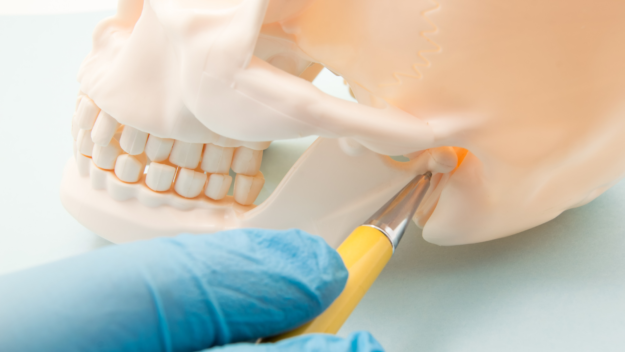TMJ pain involves the temporomandibular joint (TMJ), which connects the skull to the jawbone and operates similar to a sliding hinge. An estimated 10 million people in the U.S. suffer from TMJ pain. It’s important to be aware of the pain it can cause and how it should be treated when you’re wondering, “What is TMJ pain?”
What is TMJ?
If you have pain near your jaw, you may want to know, “What is TMJ pain?” TMJ causes discomfort and pain in the jaw, which can make it difficult to open and close the mouth. You may feel pain or tenderness in the jaw, as well as have difficulty chewing while consuming food. There may be aching pain near the ear, as well as locking of the joint as you move your mouth.
There are a variety of causes of TMJ, which include when the disk becomes misaligned or starts to erode. TMJ can also develop when the cartilage around the joint deteriorates due to conditions like arthritis. If you suffer from an injury, the joint may even become damaged and lead to long-term issues.
Some of the risk factors that can lead to TMJ include grinding or clenching of the teeth, different types of arthritis, diseases that affect the connective tissues, and jaw injuries.
What Happens During a TMJ Flare-up?
The discomfort can range from sharp jolts to stabbing pain, depending on the severity of the condition and where the pain is located.
Joint/Jaw Pain
During a TMJ flare-up, many people experience on-and-off joint pain that is inconsistent and lasts throughout the day. The pain may trigger headaches and migraines. The jaw can also pop out of place when you attempt to eat a sandwich, talk, or yawn.
Limited Jaw Movement
Limited jaw movement is one of the main complaints most people have during a flare-up. This can make it challenging to bite down to eat into food or even shout or yell. You may notice clicking and popping sounds when you chew different types of food. This can also occur as you’re talking. The sound isn’t always loud enough to be heard by other individuals but is easy for you to hear because the joint is close to your ear.
Stress
TMJ flare-ups can occur when you spend several hours each day in front of a computer screen, which places excess strain on your neck and face muscles. Insufficient sleep and a poor diet are additional factors that can trigger flare-ups.
According to nucca.org, stress can also lead to inflammation in the body and trigger TMJ issues. Stress also leads many people to clench their jaw more frequently.
Recovering From TMJ
There are several ways to ease the symptoms that come with your TMJ flaring up. Heat and cold applications are effective and can help the issues resolve quicker, according to heaptpaininstitute.com. You may also want to visit a physical therapist who can introduce you to different types of exercises and stretches that realign your jaw. They can even provide you with a specialized splint that helps the jaw gradually move back into place.
As you attempt to recover, avoid chewing gum and opt for eating softer foods that are easier to bite into. Botox that is injected into the masseter muscles has also been proven to relax the jaw and offer relief within a few days or weeks.
You can also find a TMJ specialist to ensure you obtain the guidance of an expert who can evaluate your condition. They can address the underlying cause of the issues to ensure they’re resolved quickly and the pain or discomfort quickly resolves to avoid further interruptions.














